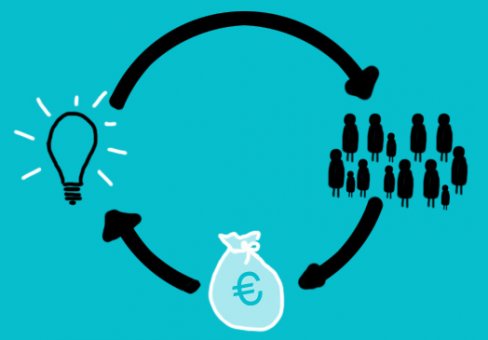Crowdfunding Can Solve More Problems than Social Scientists
Democracy works best alongside civil society. However, civil society is built by solving local issues without relying on the remote hands of politicians and democracy. It may sound like a paradox, but in reality, the expansion of so-called civil society requires neither politicians or more elections, nor longer electoral programs.

Life in a Civil Society
When French philosopher de Tocqueville travelled around America in the 19th century, he was amazed by the civil society there in comparison with France. What astonished him the most were not the voters flipping through the electoral programs of political parties and politicians, nor public discussions about federal spending.
It was the ability of American people to shape and form associations, clubs, and societies to solve any problem they faced. He admired the people who did not wait for the help of politicians, but joined forces and dealt with a problem using local knowledge of particular place and time.
At the beginning of the 20th century, practically every American was a member of several associations which dealt with everything ranging from entertainment, addiction struggles, insurance provision, charity, retirement or local infrastructure.
When the Statue of Liberty came from France to New York at the end of the 19th century, it was necessary to build a pedestal for it. Then Governor Theodore Roosevelt (not to be confused with Franklin D. Roosevelt) refused to finance it from public resources. So the US residents basically crowdfunded the money to build that base. That seems unimaginable today.
Social scientists mourn for this kind of society in the US even today. One of the factors that was behind its decline was an extrusion and replacement of civil society by public services provided by the State through democratic mechanisms – a rhetorical struggle for voters’ ears and hearts. Nowadays, politicians would race one another to finance the pedestal, or the statue as a whole – all from public funds.
It is very unlikely to expect that we can create a civil society using those mechanisms which have gradually contributed to its diminution. Building a civil society from above does not work.
Civil society is important for many reasons, one of which is the creation and expansion of trust in a large open society, full of people who do not know each other personally. This trust is key for life in a society where peaceful cooperation and productive division of labor prevail. In this atmosphere, you can leave your bike unlocked at your apartment building and go to the grocery store which is open at 10 PM on a Sunday evening. A number of economic studies show that trust is one of the key factors influencing the growth of well-being in society.
It Takes a Digital Village
So how we can rebuild a civil society and increase the trust among people in a large population? One possible answer may be the Internet and associated new “social technologies” as a sharing economy and crowdfunding.
The sharing economy has based its business model on improving trust between complete strangers who are not afraid to spend the night in a stranger’s home, or vice versa, to let someone they’ve never met stay at their own place. Or they are not fearful of getting into a car and letting themselves be taken hundreds of miles across the country, confident that they will reach their destination.
The sharing economy creates special “virtual clubs” that make it possible to spread benefits of small communities to a large, open society.
Crowdfunding facilitates connection of people to solve their local problems. If your local park is decaying, your neighborhood is exposed to increasing crime, or public lighting is shut down due t local government’s fiscal problems, with a crowdfunding platform you can put together the necessary funds to solve the problems by your own citizen’s initiative, without having to attend a Government meeting and revise the budget.
People are hardly excited about distant and abstract ideas, such as participation in the democratic process, or involvement in a “public discussion”. It is much easier to get them involved in action that is happening around them and to trust people when they see a direct improvement in their own situation. The Internet brings these possibilities and new “social technologies” like sharing economy and crowdfunding. This can be one of the ways that we restore - or create - our civil society.







